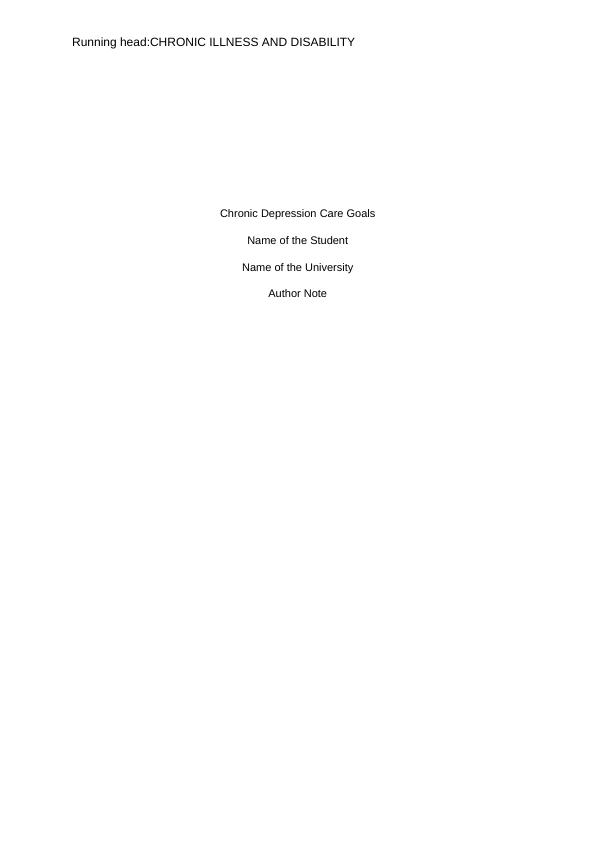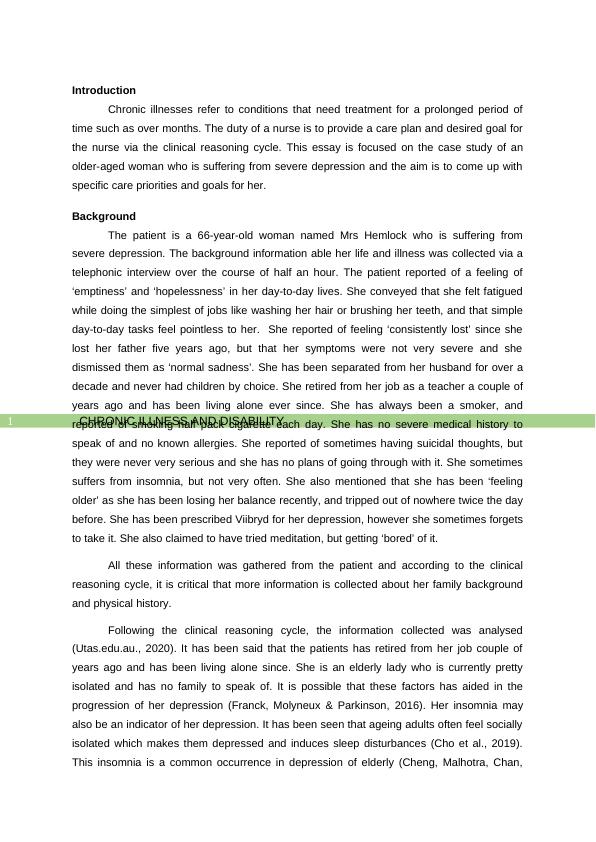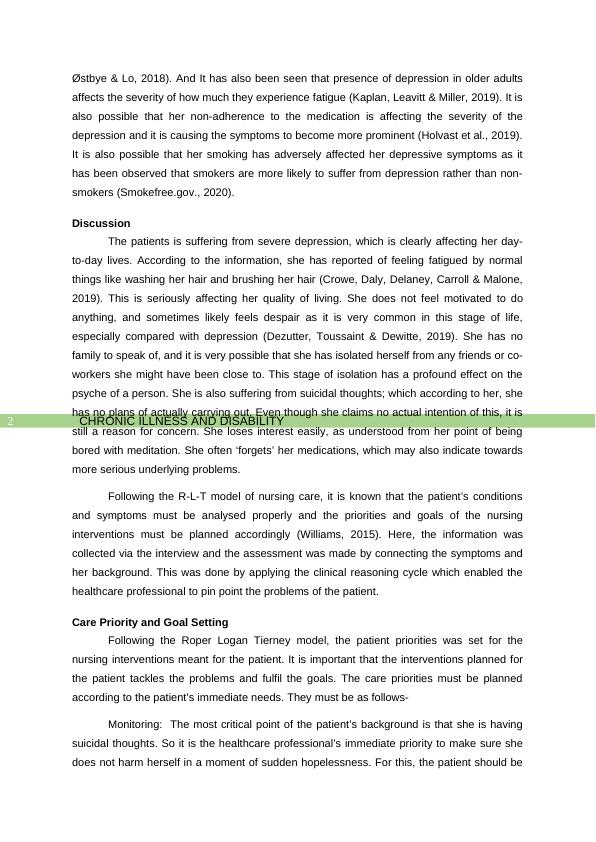Assignment on Chronic Illness And Disability
Added on 2022-08-20
8 Pages2603 Words9 Views
Running head:CHRONIC ILLNESS AND DISABILITY
Chronic Depression Care Goals
Name of the Student
Name of the University
Author Note
Chronic Depression Care Goals
Name of the Student
Name of the University
Author Note

CHRONIC ILLNESS AND DISABILITY1
Introduction
Chronic illnesses refer to conditions that need treatment for a prolonged period of
time such as over months. The duty of a nurse is to provide a care plan and desired goal for
the nurse via the clinical reasoning cycle. This essay is focused on the case study of an
older-aged woman who is suffering from severe depression and the aim is to come up with
specific care priorities and goals for her.
Background
The patient is a 66-year-old woman named Mrs Hemlock who is suffering from
severe depression. The background information able her life and illness was collected via a
telephonic interview over the course of half an hour. The patient reported of a feeling of
‘emptiness’ and ‘hopelessness’ in her day-to-day lives. She conveyed that she felt fatigued
while doing the simplest of jobs like washing her hair or brushing her teeth, and that simple
day-to-day tasks feel pointless to her. She reported of feeling ‘consistently lost’ since she
lost her father five years ago, but that her symptoms were not very severe and she
dismissed them as ‘normal sadness’. She has been separated from her husband for over a
decade and never had children by choice. She retired from her job as a teacher a couple of
years ago and has been living alone ever since. She has always been a smoker, and
reported of smoking half pack cigarette each day. She has no severe medical history to
speak of and no known allergies. She reported of sometimes having suicidal thoughts, but
they were never very serious and she has no plans of going through with it. She sometimes
suffers from insomnia, but not very often. She also mentioned that she has been ‘feeling
older’ as she has been losing her balance recently, and tripped out of nowhere twice the day
before. She has been prescribed Viibryd for her depression, however she sometimes forgets
to take it. She also claimed to have tried meditation, but getting ‘bored’ of it.
All these information was gathered from the patient and according to the clinical
reasoning cycle, it is critical that more information is collected about her family background
and physical history.
Following the clinical reasoning cycle, the information collected was analysed
(Utas.edu.au., 2020). It has been said that the patients has retired from her job couple of
years ago and has been living alone since. She is an elderly lady who is currently pretty
isolated and has no family to speak of. It is possible that these factors has aided in the
progression of her depression (Franck, Molyneux & Parkinson, 2016). Her insomnia may
also be an indicator of her depression. It has been seen that ageing adults often feel socially
isolated which makes them depressed and induces sleep disturbances (Cho et al., 2019).
This insomnia is a common occurrence in depression of elderly (Cheng, Malhotra, Chan,
Introduction
Chronic illnesses refer to conditions that need treatment for a prolonged period of
time such as over months. The duty of a nurse is to provide a care plan and desired goal for
the nurse via the clinical reasoning cycle. This essay is focused on the case study of an
older-aged woman who is suffering from severe depression and the aim is to come up with
specific care priorities and goals for her.
Background
The patient is a 66-year-old woman named Mrs Hemlock who is suffering from
severe depression. The background information able her life and illness was collected via a
telephonic interview over the course of half an hour. The patient reported of a feeling of
‘emptiness’ and ‘hopelessness’ in her day-to-day lives. She conveyed that she felt fatigued
while doing the simplest of jobs like washing her hair or brushing her teeth, and that simple
day-to-day tasks feel pointless to her. She reported of feeling ‘consistently lost’ since she
lost her father five years ago, but that her symptoms were not very severe and she
dismissed them as ‘normal sadness’. She has been separated from her husband for over a
decade and never had children by choice. She retired from her job as a teacher a couple of
years ago and has been living alone ever since. She has always been a smoker, and
reported of smoking half pack cigarette each day. She has no severe medical history to
speak of and no known allergies. She reported of sometimes having suicidal thoughts, but
they were never very serious and she has no plans of going through with it. She sometimes
suffers from insomnia, but not very often. She also mentioned that she has been ‘feeling
older’ as she has been losing her balance recently, and tripped out of nowhere twice the day
before. She has been prescribed Viibryd for her depression, however she sometimes forgets
to take it. She also claimed to have tried meditation, but getting ‘bored’ of it.
All these information was gathered from the patient and according to the clinical
reasoning cycle, it is critical that more information is collected about her family background
and physical history.
Following the clinical reasoning cycle, the information collected was analysed
(Utas.edu.au., 2020). It has been said that the patients has retired from her job couple of
years ago and has been living alone since. She is an elderly lady who is currently pretty
isolated and has no family to speak of. It is possible that these factors has aided in the
progression of her depression (Franck, Molyneux & Parkinson, 2016). Her insomnia may
also be an indicator of her depression. It has been seen that ageing adults often feel socially
isolated which makes them depressed and induces sleep disturbances (Cho et al., 2019).
This insomnia is a common occurrence in depression of elderly (Cheng, Malhotra, Chan,

CHRONIC ILLNESS AND DISABILITY2
Østbye & Lo, 2018). And It has also been seen that presence of depression in older adults
affects the severity of how much they experience fatigue (Kaplan, Leavitt & Miller, 2019). It is
also possible that her non-adherence to the medication is affecting the severity of the
depression and it is causing the symptoms to become more prominent (Holvast et al., 2019).
It is also possible that her smoking has adversely affected her depressive symptoms as it
has been observed that smokers are more likely to suffer from depression rather than non-
smokers (Smokefree.gov., 2020).
Discussion
The patients is suffering from severe depression, which is clearly affecting her day-
to-day lives. According to the information, she has reported of feeling fatigued by normal
things like washing her hair and brushing her hair (Crowe, Daly, Delaney, Carroll & Malone,
2019). This is seriously affecting her quality of living. She does not feel motivated to do
anything, and sometimes likely feels despair as it is very common in this stage of life,
especially compared with depression (Dezutter, Toussaint & Dewitte, 2019). She has no
family to speak of, and it is very possible that she has isolated herself from any friends or co-
workers she might have been close to. This stage of isolation has a profound effect on the
psyche of a person. She is also suffering from suicidal thoughts; which according to her, she
has no plans of actually carrying out. Even though she claims no actual intention of this, it is
still a reason for concern. She loses interest easily, as understood from her point of being
bored with meditation. She often ‘forgets’ her medications, which may also indicate towards
more serious underlying problems.
Following the R-L-T model of nursing care, it is known that the patient’s conditions
and symptoms must be analysed properly and the priorities and goals of the nursing
interventions must be planned accordingly (Williams, 2015). Here, the information was
collected via the interview and the assessment was made by connecting the symptoms and
her background. This was done by applying the clinical reasoning cycle which enabled the
healthcare professional to pin point the problems of the patient.
Care Priority and Goal Setting
Following the Roper Logan Tierney model, the patient priorities was set for the
nursing interventions meant for the patient. It is important that the interventions planned for
the patient tackles the problems and fulfil the goals. The care priorities must be planned
according to the patient’s immediate needs. They must be as follows-
Monitoring: The most critical point of the patient’s background is that she is having
suicidal thoughts. So it is the healthcare professional’s immediate priority to make sure she
does not harm herself in a moment of sudden hopelessness. For this, the patient should be
Østbye & Lo, 2018). And It has also been seen that presence of depression in older adults
affects the severity of how much they experience fatigue (Kaplan, Leavitt & Miller, 2019). It is
also possible that her non-adherence to the medication is affecting the severity of the
depression and it is causing the symptoms to become more prominent (Holvast et al., 2019).
It is also possible that her smoking has adversely affected her depressive symptoms as it
has been observed that smokers are more likely to suffer from depression rather than non-
smokers (Smokefree.gov., 2020).
Discussion
The patients is suffering from severe depression, which is clearly affecting her day-
to-day lives. According to the information, she has reported of feeling fatigued by normal
things like washing her hair and brushing her hair (Crowe, Daly, Delaney, Carroll & Malone,
2019). This is seriously affecting her quality of living. She does not feel motivated to do
anything, and sometimes likely feels despair as it is very common in this stage of life,
especially compared with depression (Dezutter, Toussaint & Dewitte, 2019). She has no
family to speak of, and it is very possible that she has isolated herself from any friends or co-
workers she might have been close to. This stage of isolation has a profound effect on the
psyche of a person. She is also suffering from suicidal thoughts; which according to her, she
has no plans of actually carrying out. Even though she claims no actual intention of this, it is
still a reason for concern. She loses interest easily, as understood from her point of being
bored with meditation. She often ‘forgets’ her medications, which may also indicate towards
more serious underlying problems.
Following the R-L-T model of nursing care, it is known that the patient’s conditions
and symptoms must be analysed properly and the priorities and goals of the nursing
interventions must be planned accordingly (Williams, 2015). Here, the information was
collected via the interview and the assessment was made by connecting the symptoms and
her background. This was done by applying the clinical reasoning cycle which enabled the
healthcare professional to pin point the problems of the patient.
Care Priority and Goal Setting
Following the Roper Logan Tierney model, the patient priorities was set for the
nursing interventions meant for the patient. It is important that the interventions planned for
the patient tackles the problems and fulfil the goals. The care priorities must be planned
according to the patient’s immediate needs. They must be as follows-
Monitoring: The most critical point of the patient’s background is that she is having
suicidal thoughts. So it is the healthcare professional’s immediate priority to make sure she
does not harm herself in a moment of sudden hopelessness. For this, the patient should be

End of preview
Want to access all the pages? Upload your documents or become a member.
Related Documents
Bio-Psychosocial Factors of Depression in Older Adults in Aged Care Facilitieslg...
|11
|3086
|352
Case study of an elderly person suffering from depressionlg...
|11
|3449
|360
Chronic Illness and Disability PDFlg...
|9
|2531
|13
Review of Therapy Session | Assignmentlg...
|6
|1214
|15
Mental Health Nursing: Case Study of Cognitive Impairment and Care Planlg...
|10
|2500
|169
The Concept of Cultural Safety - PDFlg...
|15
|4299
|110
